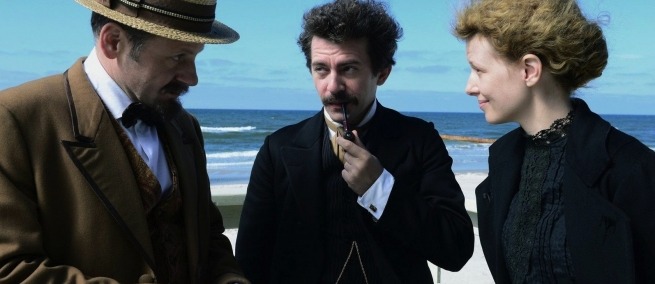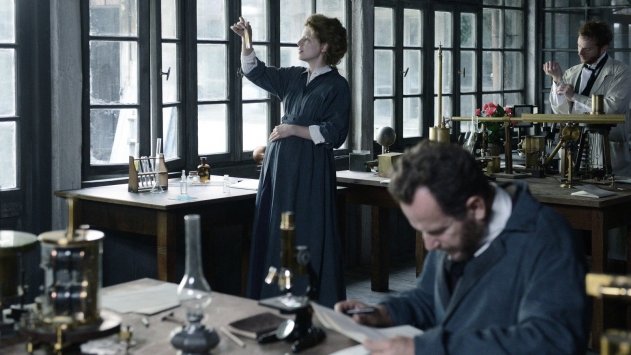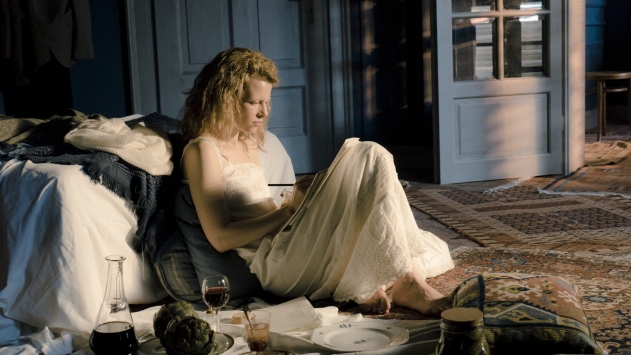
A new film about the trailblazing Polish physicist Marie Curie–the first person to win two Nobel Prizes– made its United States premiere at the New York Jewish Film Festival on January 24, 2017. MARIE CURIE: THE COURAGE OF KNOWLEDGE is written, directed, edited, and produced by French filmmaker Marie Noëlle who herself wanted to be a scientist; it stars Karolina Gruszka (INLAND EMPIRE) as Marie Curie and Charles Berling (ELLE) as Pierre Curie. The biopic focuses on the years between Curie’s first and second Nobel Prizes.
Marie and Pierre Curie won the Nobel Prize in Physics in 1903 for their study of radioactivity–they discovered that a mineral then called pitchblende contained radioactive substances. In 1911, Marie Curie won the Nobel Prize in Chemistry for isolating radium as a pure metal; it became atomic number 88 on the periodic table of elements. In the years between the awards, everything in Curie’s personal life changed. Her second daughter, Ève, was born. Her husband was killed two years later in an accident. Curie then had a love affair with the physicist Paul Langevin who was unhappily married–but the affair scandalized the public and the Swedish government uninvited Curie from the Nobel Prize ceremony. Noëlle said that she was inspired to make the film after she discovered the scandal. “She was a widow, she fell in love with a man who was a known womanizer, but he was suddenly the victim and she was a whore. I asked myself, how must that have been for her?”

Science & Film attended the premiere of MARIE CURIE at Walter Reade Theater and the subsequent discussion with the director. “If you are searching for the origins of life, or the secrets of nature, you must love life,” said Noëlle. “If you love life you have a certain type of sensuality. I wanted [the film’s] images to be beautiful and to show that fascination with the beautify of life and [the Curies’] love for that.”
The work Marie and Pierre Curie did together broke new ground in our understanding of the world. By boiling pitchblende the Curies distilled crystals of radium which glow blue in the dark. Pierre Curie was fascinated by its shine, and would carry a small sample around. After a time, according to Noëlle, “Pierre Curie had some burns on his skin. Instead of complaining he thought, oh that’s interesting that my skin is damaged, that means one can do something with that–perhaps apply it to small tumors on the skin called Squamous Cell Carcinoma. He made a small applicator to put the radium in and they were very successful at the time. Pierre Curie then said, if we can cure the tumors that are outside, why can’t we cure the tumors that are inside? That’s how they came to cancer. Cancer at the time was not the illness it is today; the most problematic illness at the time was tuberculosis and they did not know as much about cancer. But the Curies developed the first successful cancer therapy in the world.”

In researching the film, Noëlle spoke with Marie Curie’s granddaughter, the nuclear physicist Hélène Langevin-Joliot. She actually married the grandson of Paul Langevin, with whom Marie Curie had an affair. “I thought it’s nice,” Noëlle said. “It’s as if love is an energy which does not get destroyed, it just jumps around.”
MARIE CURIE: THE COURAGE OF KNOWLEDGE has distribution in Germany and Poland so far. There is a Sloan-supported film about Marie Curie in development. It is set to star Diane Kruger as Marie Curie. For more, read Science & Film’s interview with screenwriter Kathryn Maughan.